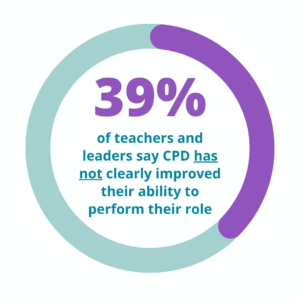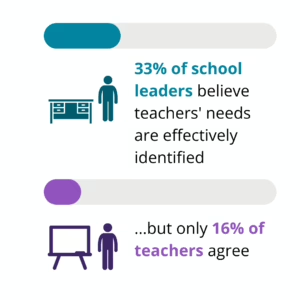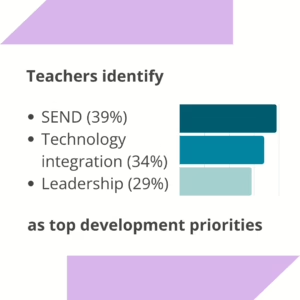Insights from over 1,000 teachers and school leaders: what we are learning and what needs to change?
Around £1 billion is spent annually on teacher CPD in England – yet only 1 in 4 teachers say it adequately considers pupil needs.
A landmark national survey commissioned by the Teacher Development Trust reveals the stark gap between investment and impact, based on responses from over 1,000 teachers and school leaders.
Developed in partnership with YouGov, this research highlights both strengths in current CPD provision and critical gaps preventing high-quality, impactful development for staff that has a real impact on pupil outcomes.
High-quality CPD is one of the most powerful levers for improving teaching and pupil outcomes. Collectively, we’re investing around £1 billion annually in teacher development – from inset days and other in-service training, to the unprecedented investment in National Professional Qualifications, the Early Career Framework and infrastructure like Teaching School Hubs and behaviour hubs. But while each of these initiatives is evaluated piecemeal, there is little understanding about how that investment translates into teachers’ lived experience.
This research provides the missing piece of the jigsaw: the first comprehensive picture of how CPD is actually experienced on the ground.
The findings reveal a troubling gap between investment and impact.
‘Not enough time is spent finding out specific needs of staff to ensure that CPD is effective. There is a culture of blanket CPD for all when it is not relevant to all.’
TDT CPD Landscape Report, 2025
Key Findings
- 1 in 4 teachers had less than one day of formal CPD in 2024/25.
- 40% of teachers and leaders said their CPD did not clearly improve their ability to perform their role.
- Only 1 in 4 felt CPD in their school considers pupils’ needs.
- Just 1 in 10 believe CPD meets the diverse needs of staff.
- Coaching, one of the most impactful CPD formats, remains among the least used.
- Senior leaders report far higher confidence and engagement with CPD than classroom teachers, signalling a widening perception gap.



What Teachers and Leaders Are Asking For
The message is clear: Staff want CPD that is relevant, personalised, based and embedded in school culture, not one-off training.
The findings show that schools need:
- Stronger leadership of CPD, including needs analysis and evaluation
- Time and structures that protect meaningful learning
- Collaborative, coaching-based models rather than blanket delivery
- Alignment between CPD, staff needs and pupil outcomes
- Focus on SEND, technology and leadership development



How TDT Can Help
At Teacher Development Trust, we work with school and trust leaders to:
✅ Build evidence-informed CPD strategies
✅ Embed coaching and collaboration across teams
✅ Support needs analysis, leadership development and evaluation
Whether you’re rethinking your CPD offer or validating what’s already working, this report gives you the national picture to benchmark against.
Download the Full Report
Share it with your SLT, CPD leads and governors. Use it to benchmark your provision, identify quick wins, and make the case for change. This research will be repeated annually – download now to see where you stand




